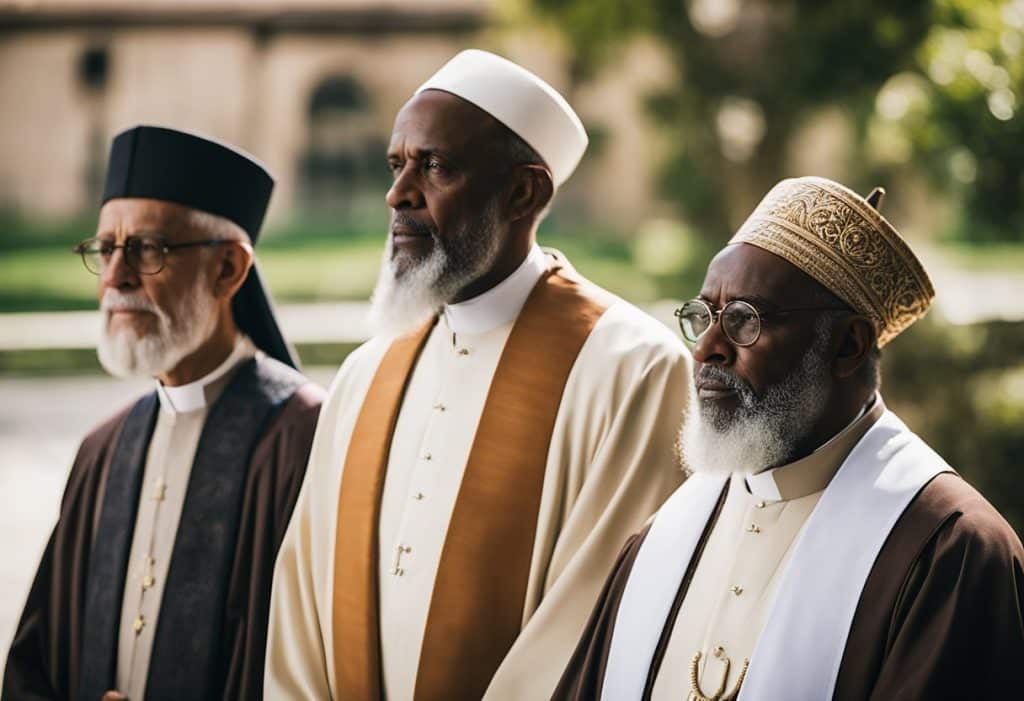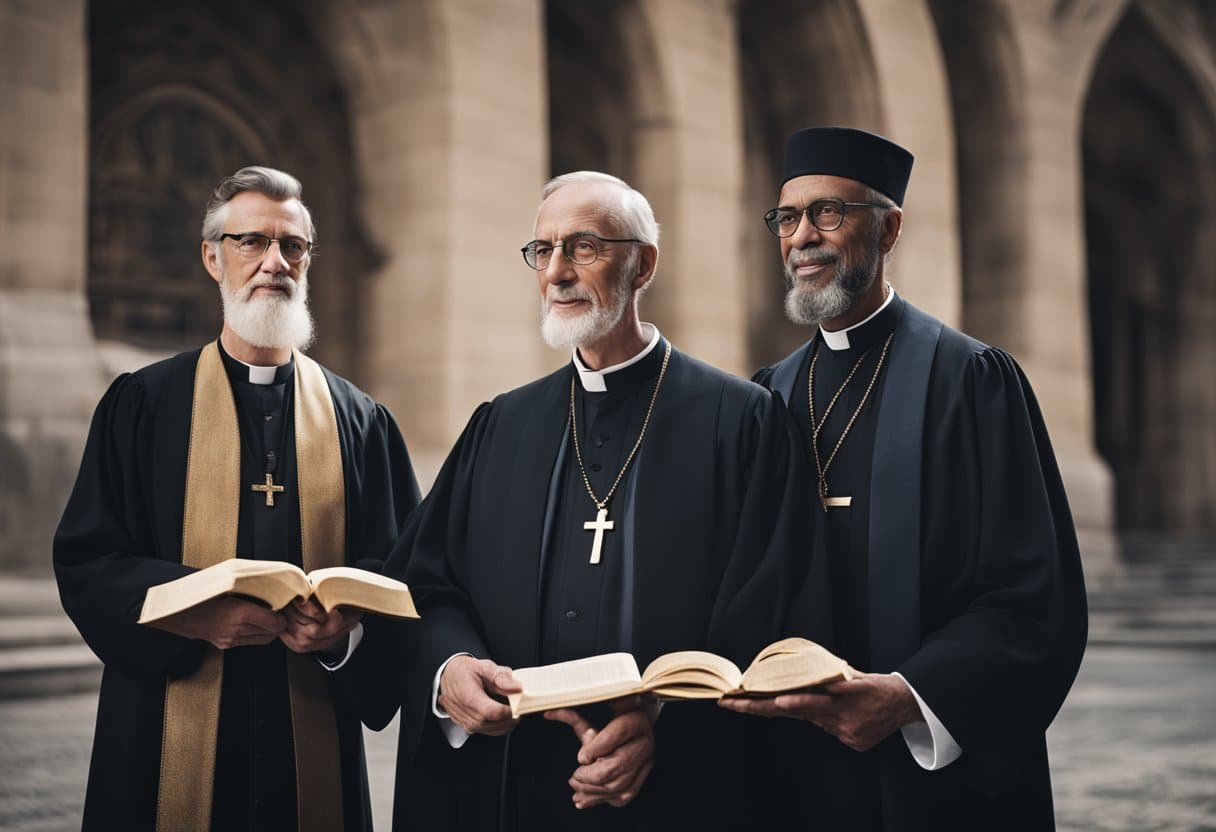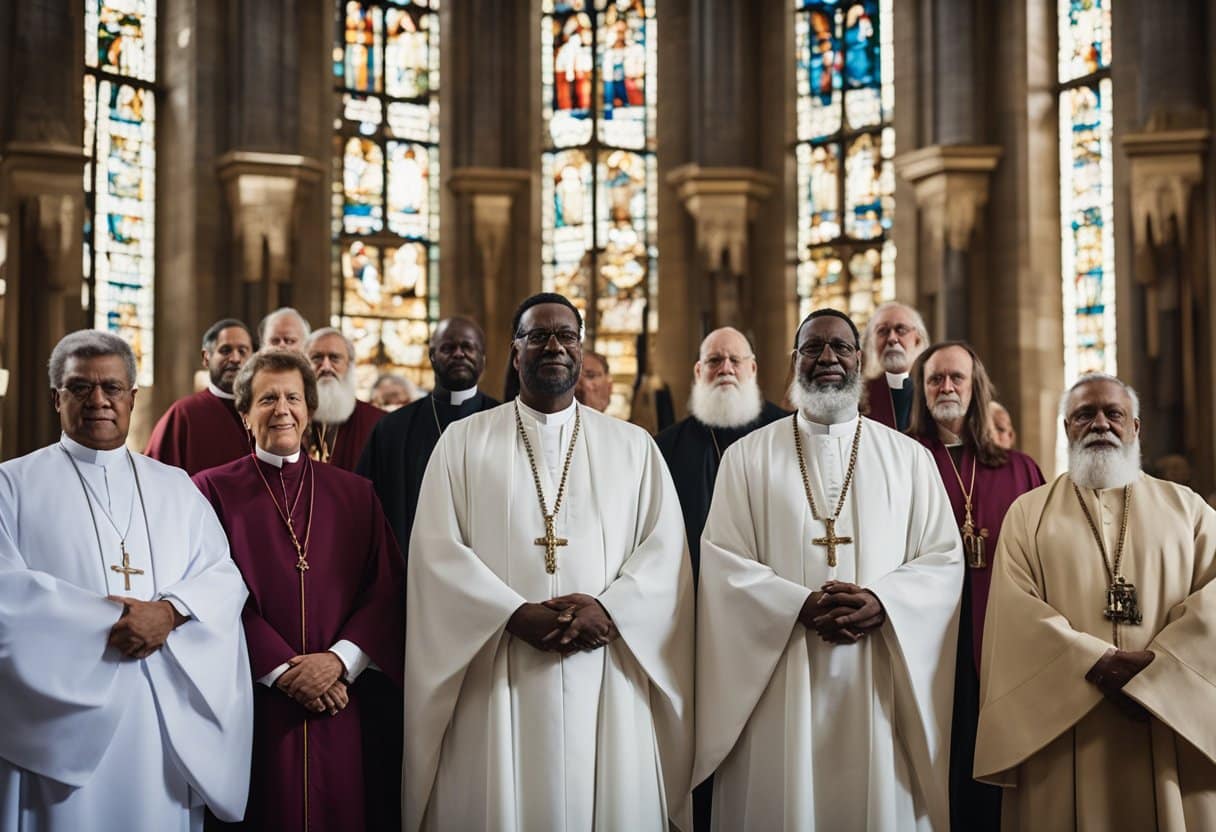Understanding the differences between Reverend, Minister, and Pastor can help you better understand the roles of these leaders and the significance of their titles.
While these titles all refer to religious leaders, they each have distinct meanings and implications within the church.

First, let’s define each title. A Reverend is an honorific prefix given to ordained clergy members, signifying respect and reverence.
A Minister is a functional title that describes a person’s role within a religious organization.
Finally, a Pastor is someone who shepherds and provides spiritual oversight to a congregation. While these titles may seem similar, they each have unique connotations and responsibilities.
It’s important to note that the usage of these titles can vary depending on the denomination or religious organization.
In some cases, the term “Minister” may be interchangeable with “Pastor” or “Reverend,” while in others, they may carry distinct meanings.
Besides, some religious leaders may hold multiple titles or use different titles depending on the context.
By understanding the nuances of these titles, you can better understand the roles and responsibilities of religious leaders within your community.
Related Topic That You Might Be Interested: Pastor vs. Priest: What’s The Difference?
Defining the Terms: Reverend vs Minister vs Pastor
When it comes to religious titles, there can be confusion about what the difference is between Reverend, Minister, and Pastor.
To help clarify, we will define each term and explain their roles within the church.
Reverend: An Honorific Title
Reverend is an honorific title given to ordained clergy members, signifying respect and reverence. It is a title, not a position given.
The term is often used as a form of address for those who have been ordained, and it is typically used before the person’s name.
Minister: A Broad Role
A Minister is a broad title that describes a person’s role within a religious organization. It is a functional title that can refer to anyone who is involved in the ministry, including pastors and other religious leaders.
The role of a Minister can vary depending on the denomination and the specific church.
Pastor: A Shepherd to the Flock
A Pastor is a religious leader who is ordained by God and leads a congregation through shepherding and bringing the Word to them.
The term comes from the Latin word for “shepherd,” and it is often used to describe someone responsible for the spiritual well-being of a group of people.
A Pastor is someone who shepherds and provides spiritual oversight to a congregation.
It is clear that the Reverend, Minister, and Pastor are all important roles within the church, but they have different meanings and implications.
Reverend is an honorific title, Minister is a broad title that describes a person’s role within a religious organization, and Pastor is a religious leader who is ordained by God and leads a congregation through shepherding and bringing the Word to them.
Historical and Biblical Context

Biblical References to Church Leaders
The Bible mentions several different titles for church leaders, including “elder,” “overseer,” and “shepherd.”
In the New Testament, the apostle Paul frequently refers to these roles in his letters to various churches.
For example, in 1 Peter 5, he instructs the elders to “shepherd the flock of God that is among you,” and in Ephesians 4:11, he lists “apostles, prophets, evangelists, pastors, and teachers” as gifts that Christ gave to the church.
Evolution of Church Leadership Roles
Over time, the specific titles and roles of church leaders have evolved. In the early church, there were no formal titles, and leaders were often referred to simply as “brothers” or “sisters.”
As the church grew and became more organized, specific roles emerged. The term “minister” comes from the Latin word for “servant,” and originally referred to anyone who served in the church.
“Pastor” comes from the Latin word for “shepherd,” and was used to describe those who provided spiritual guidance and care to the members of a congregation. “Reverend” is a title of respect given to ordained clergy members.
In modern times, the specific roles and responsibilities of church leaders can vary widely depending on the denomination and context. Some churches use the terms “minister” and “pastor” interchangeably, while others make a distinction between the two based on their specific duties.
For instance, a minister may focus more on administrative tasks, while a pastor may focus more on pastoral care and preaching.
Theological Education and Ordination

The Path to Ordination
If you’re interested in becoming an ordained member of the clergy, there are a few steps you’ll need to take.
First, you’ll need to choose a denomination and a path to ordination. Some denominations have a more formal process, while others may be more informal.
Generally, you’ll need to complete a period of theological education, receive approval from your denomination’s governing body, and be ordained by a bishop or other religious leader.
Educational Requirements for Clergy
The educational requirements for clergy can vary depending on the denomination. However, in general, most denominations require that their clergy members complete a period of theological education.
This education can take many forms, including attending a seminary or divinity school, completing an online theological program, or studying under the guidance of a mentor.
During the theological education process, you’ll learn about the history and teachings of your denomination, as well as the role of the clergy within the church.
You’ll also learn about pastoral care, counseling, and other skills that are necessary for working with members of your congregation.
Once you’ve completed your theological education, you’ll need to receive approval from your denomination’s governing body. This approval process may involve an interview, examination, or other evaluation of your knowledge and skills.
Finally, you’ll need to be ordained by a bishop or other religious leader.
This process typically involves a ceremony in which you’ll make vows to serve your congregation and your denomination.
After your ordination, you’ll be recognized as an ordained member of the clergy, with the authority to perform religious services and provide spiritual guidance to your congregation.
Roles and Responsibilities

Spiritual Leadership and Guidance
As a spiritual leader, you play an important role in guiding your congregation towards a deeper understanding of their faith.
You are responsible for providing spiritual guidance and support to your community, leading worship services, and preaching sermons that inspire and motivate your congregation.
You must help your community understand the teachings of your faith and apply them to their daily lives.
Administrative and Ceremonial Duties
In addition to your spiritual leadership and guidance, you also have administrative and ceremonial duties.
You are responsible for overseeing the day-to-day operations of your church, managing its finances, and ensuring that all sacraments and ceremonies are performed according to the guidelines of your faith.
This includes performing funerals, baptisms, and other ceremonies as required.
Overall, as a Reverend, Minister, or Pastor, you have a unique and important role to play in your community.
By providing spiritual guidance and support, and by overseeing the administrative and ceremonial duties of your church, you help your community deepen their faith and live a more fulfilling life.
Denominational Differences

When it comes to the titles of Reverend, Minister, and Pastor, there are some differences in their usage across various Christian denominations.
In this section, we’ll take a look at how these titles are used in some of the most common Christian denominations.
Protestantism and Its Variants
In Protestantism and its various denominations, the title of Pastor is commonly used to refer to the leader of a church or congregation.
However, the titles of Minister and Reverend are also used interchangeably with Pastor in some denominations.
For example, in Baptist churches, the title of Pastor is most commonly used, while in Presbyterian and Methodist churches, the title of Minister is more commonly used.
In some other Protestant denominations, such as the United Church of Christ, the title of Reverend is used to refer to both ordained and non-ordained ministers.
The Catholic Church and Anglican Communion
In the Catholic Church and Anglican Communion, the title of Reverend is used as an honorific prefix for ordained clergy members.
The title of Pastor is also used to refer to the leader of a church or congregation, but it is not commonly used as a formal title.
Instead, the title of Father is often used to refer to Catholic priests, while Anglican priests are often referred to as Reverend Father or Reverend Canon.
Other Christian Denominations
In other Christian denominations, such as the Eastern Orthodox Church and some non-denominational churches, the titles of Reverend, Minister, and Pastor may be used interchangeably to refer to the leader of a church or congregation.
However, in general, the title of Reverend is used as an honorific prefix for ordained clergy members, while the titles of Minister and Pastor are used to refer to specific roles within a church or congregation.
Overall, the usage of these titles can vary widely depending on the specific denomination and context.
It’s important to note that while these titles can be useful in identifying the roles and responsibilities of clergy members, they are ultimately just titles, and what matters is the spiritual guidance and leadership provided by these individuals.
Community and Pastoral Care
As a religious leader, your role involves providing guidance and care to your congregation. This includes counseling and personal guidance, as well as community outreach and services.
Here are some ways that you can provide effective pastoral care to your community.
Counseling and Personal Guidance
One of the most important aspects of pastoral care is counseling and personal guidance.
As a Reverend, Minister, or Pastor, you may be called upon to provide guidance and support to individuals who are going through difficult times. This may include providing emotional support, spiritual guidance, and practical advice.
To provide effective counseling, it is important to be a good listener and to be able to empathize with your congregation.
You should be able to offer guidance and support without being judgmental or critical. It is also important to maintain confidentiality and to respect the privacy of those who come to you for help.
Community Outreach and Services
Another important aspect of pastoral care is community outreach and services. This involves reaching out to the wider community and providing support and assistance to those in need.
This may include organizing community outreach programs, such as food banks, homeless shelters, and other social services.
As a religious leader, you can also play an important role in promoting social justice and equality. This may involve speaking out against injustice and discrimination and advocating for the rights of marginalized groups.
By working to improve the lives of those in your community, you can help to build a stronger, more compassionate society.
Providing effective pastoral care requires a combination of counseling and personal guidance, as well as community outreach and services.
By being a good listener, empathetic, and supportive, you can help to guide your congregation through difficult times.
By reaching out to the wider community and advocating for social justice, you can help to create a more just and equitable society for all.
Authority and Hierarchy Within the Church
When it comes to church leadership, different levels of authority and hierarchy are important to understand.
Now, let’s take a closer look at the different levels of church leadership, the role of elders and deacons, and how these positions relate to the concepts of authority and hierarchy within the church.
Different Levels of Church Leadership
Within a church, there are typically several levels of leadership. At the top of the hierarchy is the bishop or overseer, who is responsible for overseeing the spiritual authority of the church.
Below the bishop are the pastors, who are responsible for shepherding the congregation and providing spiritual guidance. Finally, there are the deacons, who are responsible for serving the needs of the church and its members.
The Role of Elders and Deacons
Elders and deacons play important roles within the church, and their positions are often defined by specific duties and responsibilities.
Elders are typically responsible for overseeing the spiritual health of the congregation, providing guidance and counsel to the pastor, and helping to resolve conflicts within the church.
Deacons, on the other hand, are responsible for serving the physical needs of the church and its members, such as through acts of charity and service.
In some churches, the roles of elders and deacons may overlap, or there may be additional positions of leadership, such as trustees or board members.
However, regardless of the specific positions within a church, it is important to understand the hierarchy and authority structure to properly navigate and participate in the church community.
Overall, understanding the different levels of church leadership and the roles of elders and deacons can help you better understand the authority and hierarchy within the church.
Whether you are a member of a church community or simply interested in learning more about the structure of religious organizations, this knowledge can be valuable in helping you navigate and understand the world of faith.
Terminology in Practice: Usage and Misconceptions
When it comes to the terminology used to address religious leaders, there can be some confusion and misunderstandings.
In this section, we will discuss some of the common misconceptions and clarify the interchangeable use of the terms Reverend, Minister, and Pastor.
Common Misunderstandings
One of the most common misconceptions is that these terms are interchangeable and can be used interchangeably.
However, this is not always the case. While there may be some overlap in the roles and responsibilities of these religious leaders, there are also some key differences.
Another common misunderstanding is that these terms are formal titles. While they are often used as formal titles, they are not technically formal titles in the same way that “Doctor” or “Professor” are.
Instead, they are more like functional titles that describe a person’s role within a religious organization.
Interchangeable Use and Clarifications
While the terms Reverend, Minister, and Pastor are not always interchangeable, there are some situations where they can be used interchangeably.
For instance, in some denominations, the terms are used synonymously to refer to the leader of a church.
It is also important to note that Reverend is a form of address given to ordained clergy members, signifying respect and reverence.
This term is often used in formal settings, such as when addressing a letter or introducing a speaker. On the other hand, Minister and Pastor are more functional titles that describe a person’s role within a religious organization.
The term Reverend comes from the Latin word “reverendus,” which means “worthy of respect.” Similarly, the term Pastor comes from the Latin word “pastor,” which means “shepherd.” Both of these terms convey a sense of reverence and respect for the religious leader.
In conclusion, while there may be some confusion and misunderstandings surrounding the terminology used to address religious leaders, it is important to understand the differences between Reverend vs Minister vs Pastor, and their appropriate usage.
By clarifying the interchangeable use and common misconceptions surrounding the terms Reverend, Minister, and Pastor, you can better understand and appreciate the roles and responsibilities of these important religious leaders.
